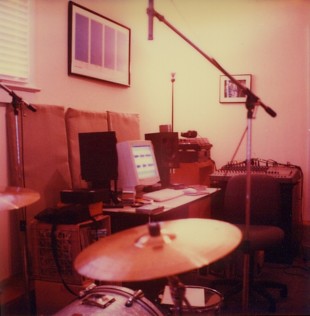Reviews must be submitted
to me in email and please allow at least 48 hours before you start asking
when your review is going to be posted. Submit you review in TEXT
format, and a picture of your RM800 if you have one (a picture is not required
so don't worry about it if you don't have one). Images must
be in either JPG or GIF format. I will take care of the rest.
Email your reviews and images HERE.
 When
I was looking to upgrade my home studio console, your website was a big
help in my purchase of a 16 channel RM800. My old mixer was a very
basic Allen & Heath 12x2 Scepter rack mixer that sounded *sweet* (very
musical EQ), but just wasn't very flexible for my increasingly complicated
tracking needs. I needed busses, man! I stumbled across mine
on eBay for $450 and it's in excellent condition. This is another
example of a great-sounding, best-bang-for-the-buck piece of gear that
never quite makes a blip on the radar. I mainly use mine to track
drums, bass, guitar and keys into my PC/Win98 DAW, using Cool Edit Pro
and an Aardvark Systems soundcard; my monitors are Dynaudio BM5's and I
use Monster or Mogami cables. (in the photo you can see it way in
the back of the studio!) Using a good DI box and good mics, guitar
and bass record great. Tracking drums is fairly smooth; while it's
not optimal to record a kit in the same room as your recording gear (space
dictates it), it is an important feature that the RM800 is transparent
enough so I can fix any small problems later within the DAW. The
mic preamps are of good quality, but I foresee myself upgrading to some
Class A/ultra hi-fi mic pre's as soon as I can save up the dough.
The EQ is decent, a fairly basic setup; I miss my Allen & Heath's EQ,
though (those Brits know their stuff). I don't rely on the EQ too
much, seeing how all EQ-ing usually goes on inside the computer.
The main strengths of the RM800 is routing & monitoring options, good
headroom (accurate metering, what a concept); it's quiet, clean and it's
not a typical black/dark colored small mixer you have to squint at -- the
color scheme is actually waaaay better on the eyes. At my day job,
I use a Mackie 1604-VLZ (generally for monitoring only), and Mackie makes
great product, but I don't think they are as well thought out, plus I feel
cramped in whenever I twist some knobs. Yeah, the RM800's have
a fairly big footprint, but I like a roomy, simple board and long-throw
faders better.
When
I was looking to upgrade my home studio console, your website was a big
help in my purchase of a 16 channel RM800. My old mixer was a very
basic Allen & Heath 12x2 Scepter rack mixer that sounded *sweet* (very
musical EQ), but just wasn't very flexible for my increasingly complicated
tracking needs. I needed busses, man! I stumbled across mine
on eBay for $450 and it's in excellent condition. This is another
example of a great-sounding, best-bang-for-the-buck piece of gear that
never quite makes a blip on the radar. I mainly use mine to track
drums, bass, guitar and keys into my PC/Win98 DAW, using Cool Edit Pro
and an Aardvark Systems soundcard; my monitors are Dynaudio BM5's and I
use Monster or Mogami cables. (in the photo you can see it way in
the back of the studio!) Using a good DI box and good mics, guitar
and bass record great. Tracking drums is fairly smooth; while it's
not optimal to record a kit in the same room as your recording gear (space
dictates it), it is an important feature that the RM800 is transparent
enough so I can fix any small problems later within the DAW. The
mic preamps are of good quality, but I foresee myself upgrading to some
Class A/ultra hi-fi mic pre's as soon as I can save up the dough.
The EQ is decent, a fairly basic setup; I miss my Allen & Heath's EQ,
though (those Brits know their stuff). I don't rely on the EQ too
much, seeing how all EQ-ing usually goes on inside the computer.
The main strengths of the RM800 is routing & monitoring options, good
headroom (accurate metering, what a concept); it's quiet, clean and it's
not a typical black/dark colored small mixer you have to squint at -- the
color scheme is actually waaaay better on the eyes. At my day job,
I use a Mackie 1604-VLZ (generally for monitoring only), and Mackie makes
great product, but I don't think they are as well thought out, plus I feel
cramped in whenever I twist some knobs. Yeah, the RM800's have
a fairly big footprint, but I like a roomy, simple board and long-throw
faders better.